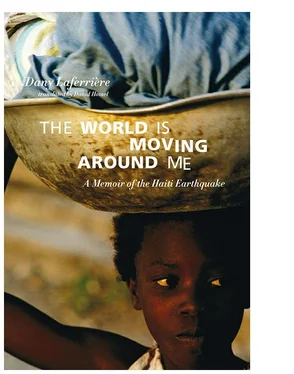The Outside World
We were sitting around a table talking in the hotel garden when Lyonel Trouillot the writer showed up. He told us what happened the day before, once night fell. Everything was pitch dark, but he left his house and headed for the hotel. Trouillot walked the entire way last night, to the hotel and back, two hours in total darkness. Knowing his health problems, the effort must have been superhuman. Today, he seemed relaxed. He had his car now. I decided to use the opportunity to go see my mother, since I haven’t been able to reach her by phone. Saint-Éloi will join us. The hotel is set back from the main road by a hundred meters or so, just enough to separate us from the city. We leave the hotel life and fall into the cauldron of Port-au-Prince and its suffocating reality.
The Mango Lady
She’s the first thing I see on the road to Pétionville. A mango vendor sitting with her back against a wall, a dozen mangos spread out before her. This is her livelihood. For her, there’s nothing new. It doesn’t occur to me to buy from her, though I love mangos. I hear Saint-Éloi’s voice behind me: “What a country!” These people are so used to finding life in difficult conditions that they could bring hope down to hell.
The First Bodies
Just outside Pétionville, I see bodies on the ground. Carefully stacked one next to the other, eight in all. I don’t know how they died or who put them here. The houses are below. Modest structures made of sheet metal. We wonder who could have placed the bodies by the side of the road. Not the government; it hasn’t recovered its wits. Not the families either, who would have found a way to bury them. Maybe the dead were just passing through, anonymous here. People are always on the move in a city where it’s hard to find a job. They look for life wherever it can be found. Later I learn that the dead are so numerous they can’t be buried individually. The figure climbs by the hour and takes over everything, to the point that people don’t talk about the dead, but only their number.
Rhythm
We reach Pétionville. I spot a dozen broken houses. Maybe there are more. I can see only those along the road. Pétionville itself seems to have survived. I breathe a little easier. People are standing in small groups on the sidewalk, talking. I expected crowds crushed by pain, but daily life has already resumed its rhythm. Even misfortune can’t slow down the incessant activity in one of the poorest regions of the world.
A Bon Vivant
A man is standing by a big red gate. “That’s my father,” Saint-Éloi says. The same warm spark in his eyes. And the same way of thrusting out his chest. The two look too much alike not to be fellow pleasure-seekers. Saint-Éloi described his father as a bon vivant who likes cooking and chatting up the young vendors who pass by his door. A man whose interest in women has never slackened. Saint-Éloi gets out of the Jeep and goes to see him. I stay in the car. They talk for a while, touching each other on the forearm from time to time. Ten minutes later he returns. His father waves to us and closes the gate. “Everything all right?” I ask Saint-Éloi. “Except for a cousin who was at the Caribbean Market. They say she’d made it to the door when a cement block hit her in the head … Another step and she would have been safe.” We drove in silence to Delmas.
The Caribbean Market
We enter the enormous district of Delmas, that insatiable monster whose tentacles are getting ready to swallow up Pétionville, the fragile, middle-class suburb where there are more and more poor people. The traffic is intense in Delmas: humans and cars play bull and matador. All kinds of noises (horns, shouting, sirens) rise from a crowd that’s always on the edge of explosion. The commercial buildings that line the main road hide thousands of houses of all sizes built in such an anarchic fashion that the place is like a world unto itself. Whoever ventures into this labyrinth for the first time will wander in circles forever unless he finds a helpful soul to show him the way. The government tried unsuccessfully to make the place more orderly by putting numbers on the different entrances. The area looks like it’s been bombed. One building in five has collapsed. There are hardly any cars, which makes it amazingly easy to get around. Someone points out the Caribbean Market, always crowded with customers this time of day. My heart tightens at the thought of them under that heap of stones. People blessed with a decent salary would stop to pick up provisions here when they got out of work. They would exchange the latest gossip and use chance meetings to extend invitations of all kinds. The Caribbean Market was the crossroads of the striving middle class that had sprung up in this neighborhood over the last twenty years.
Money
I noted that very brief moment when money disappeared from circulation. For several hours, in a metropolis of three million people, no one produced a bank note to buy something. With the stores destroyed, merchandise was for the taking. It could only be given away or bartered. Commerce is generally carried out among the living. But, for once, the living were thinking only of the dead and of those who had disappeared, for whom they were searching throughout the city. The moment was brief indeed. People hadn’t even buried their dead, and already their thoughts were returning to money. They started thinking about it as soon as the future became imaginable.
A Yellow Square
That feeling of déjà vu. I know this part of town. Seeing I was upset, Trouillot slowed down. I was right, he told me, that’s the Télé-Ginen building. Compè Filo works there. And I was there yesterday at 3:30 in the afternoon. I could have been there at 4:35 too. Between two concrete slabs, I spotted a small yellow square the size of a license plate. It’s all that’s left of the little car that took me back to the Hôtel Karibe after my interview with Filo. I combed through the totally flattened building and discovered, at the back, a few photos miraculously spared next to the trophies I’d noticed yesterday on the desk of the Télé-Ginen owner, an affable woman whom Filo was quick to introduce me to. I’d been in a hurry yesterday. I had to be back at the Hôtel Karibe by five o’clock. After a lot of back and forth, since he wanted to drive me himself so we’d have time to talk in the car, Filo finally agreed to let a young journalist drop me off in that little yellow car that was now completely flattened in the wreckage of the building. The place was a strange labyrinth; first I’d come across a chorale of girls dressed in white in a trance, and then I’d listened to a pastor shouting into a screechy microphone. Walking the corridors, I realized they were taping a religious program. Meanwhile, in his studio, Filo was singing the praises of voodoo and popular culture. The building reminded me of a murderous jungle where everything proliferates wildly the minute you turn your back. Now there was no one here, no employee who could tell me what happened to the staff. Everyone seemed preoccupied by his own troubles. I remember thinking as I left Télé-Ginen yesterday that there’d be no survivors if ever fire broke out.
Musical Chairs
People move through the streets, hoping to come across a family member, a friend, a neighbor, or even an acquaintance: someone to legitimize our claim to be among the living. We’re zombies until someone calls our name. The person no one has seen could well be dead. Meanwhile, that other person thinks you’re dead, though he hopes to see you alive. There’s no way of knowing where death was waiting when you were at that particular place. Some people did all they could to show up at the meeting. Others walked away from the fatal spot a few seconds before. And to think we had no idea we were playing heads or tails with our lives. I left Télé-Ginen to get back to the Hôtel Karibe by five p.m. — but it could have been the other way around. A game of musical chairs the entire city was playing. There were a lot more people than chairs when the music started. You had to find an empty chair when it stopped at exactly 4:53 in the afternoon.
Читать дальше












